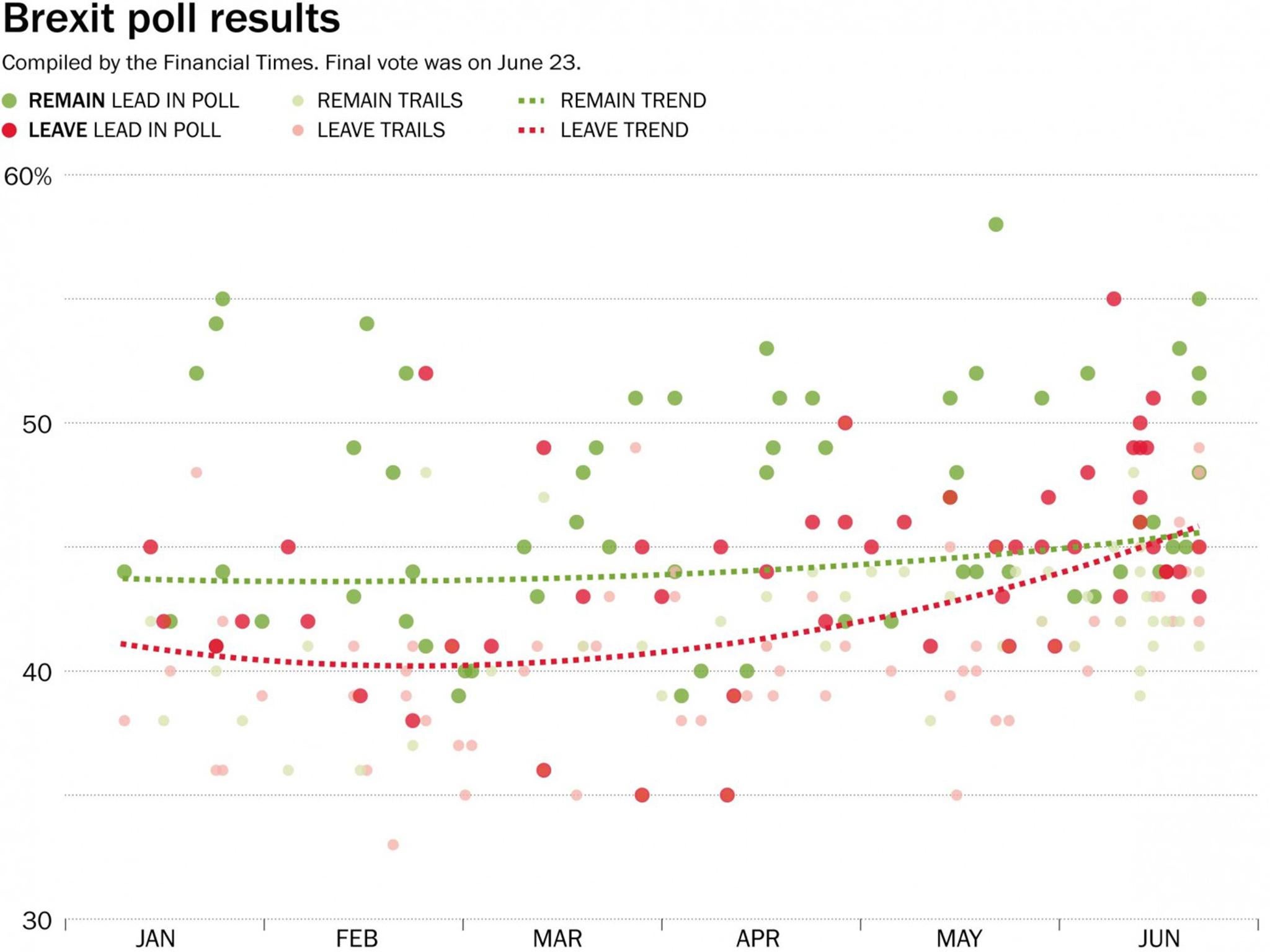Donald Trump might want to retire that Brexit talking point
Trump has at times asked that he be called 'Mr Brexit', the human embodiment of the concept that doesn't immediately click

Your support helps us to tell the story
From reproductive rights to climate change to Big Tech, The Independent is on the ground when the story is developing. Whether it's investigating the financials of Elon Musk's pro-Trump PAC or producing our latest documentary, 'The A Word', which shines a light on the American women fighting for reproductive rights, we know how important it is to parse out the facts from the messaging.
At such a critical moment in US history, we need reporters on the ground. Your donation allows us to keep sending journalists to speak to both sides of the story.
The Independent is trusted by Americans across the entire political spectrum. And unlike many other quality news outlets, we choose not to lock Americans out of our reporting and analysis with paywalls. We believe quality journalism should be available to everyone, paid for by those who can afford it.
Your support makes all the difference.Three weeks before Britons went to the polls to decide whether or not to leave the European Union, Donald Trump had what might now be called an “Aleppo moment,” in honor of Gary Johnson. Trump was being interviewed by The Hollywood Reporter on June 1 when he was asked his position on Brexit, as the referendum is commonly known.
“Huh?” Trump replied.
“Brexit,” the interviewer prompted.
“Hmm,” Trump answered.
Eventually, Trump said that he was in support of Britain leaving the union, and on June 23, that's how the country voted. Shortly afterward, Trump bragged about how he'd “called” the vote.
Nowadays, though, Trump talks about Brexit for another reason. There's a commonly understood argument that polling before the Brexit vote showed the Remain side by a wide margin, only to see a huge populist surge turn out on Election Day to vote Leave, which carried the day. To Trump, who's currently trailing Hillary Clinton by one of the widest margins he's seen in the RealClearPolitics polling average, that's an appealing idea. Maybe the same thing will happen here: A nationalist base will rush to vote Trump and, once again, those idiot polls will be proven wrong. Trump has at times asked that he be called “Mr. Brexit,” the human embodiment of that thing that didn't immediately click when he was asked about it on June 1.
There's just one little problem, as FiveThirtyEight's Harry Enten points out: That's not what the polls showed.
Over the last three months of the campaign, polling showed Leave gaining ground against Remain until the two sides were about tied in mid-June. The Financial Times compiled polling, from which we can make a handy little chart.

The Financial Times's running average by June 23 had Remain at 48 percent and Leave at 46 percent, with 6 percent undecided. On June 22, six polls came out, with Remain leading in four. There are fewer polls in the FT's tally than in Enten's, but the effect is the same: 16 Leave wins to 14 Remain wins. In April, Remain lead in twice as many polls as Leave. The final vote was Remain, 48 percent, Leave, 52 - a bit wider than polling would have suggested, but hardly the sort of poll nightmare that has been presented by Trump and his supporters.
Perhaps Trump should think about calling himself Mr. Michigan instead. In the Democratic primary in the state this year, polls consistently showed Hillary Clinton leading Bernie Sanders by over 20 points. Sanders won by 2 points. The giant miss was in part a function of bad turnout estimates thanks to the weird way in which the 2008 primary in the state was run. But it was a huge miss of the sort that renewed all sorts of “polls are bad” talk, particularly among Sanders supporters. But that poll was the exception, not the norm.
Brexit's polls were more like the norm. It was a close race coming into the final vote, and it seems like a turnout surge did contribute to the difference. Betting markets saw it differently, giving Remain a wide margin a week right before the actual vote. But betting markets aren't polls.
If this is another Brexit, as Trump said on Tuesday, that suggests that we should assume that the results will wind up in the margin of error and that, therefore, Donald Trump is poised to lose. A weird pitch for him to make in front of his own supporters, but kudos to him for his honesty.
The Washington Post
Join our commenting forum
Join thought-provoking conversations, follow other Independent readers and see their replies
Comments